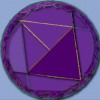Science and Philosophy
I've been researching the relationship between philosophy and science lately, and I came across this opinion during discussion:
This person claimed that scientific theories, by nature, are ultimately influenced by and based upon personal philosophies about how to interpret evidence and data. They claimed that for this reason, scientific theories are no more factual or reliable than common philosophical ideas or even religious concepts.
What are your thoughts on this? Are science and philosophy similar or even identical? What is their relationship? Are they simply categorizations of the same pursuit of knowledge?
I look forward to hearing your thoughts!Philosophy is deductive reasoning. Science is inductive reasoning. In the 1800s scientists were called naturalist philosophers. A debate was held in England where philosophers argued that naturalists should not call themselves philosophers because they did experiments. Philosophers use deductive logic.
It was decided that since they were doing science they should be called scientists, like people who do art are artists.
True science doesn't interpret data, it records it. As soon as you interpret the facts or what they might mean, you are doing deductive logic and therefore philosophy.
Asking a question is philosophical, and in science leads to experimentation using the scientific method.
Theories that can not be proven or falsified are models, and until they are proven are not considered fact. Many Worlds, the holographic principal, even the big bang are models. Models try to explain facts, but are often incomplete or wrong.
There are plenty of facts, however, and both science and philosophy are ways to discover them. They are two aspects of the same thing.The most recent cosmological and quantum theories have in fact crossed over into pure philosophy because they can't actually measure or observe or test the math. It started with String Theory which in essence is just an untestable philosophy. Now scientists are talking about a holographic universe and how it all simply takes place inside our brain. This is remarkably similar to ancient esoteric philosophy.
And again, in science anything that can be falsified is not considered fact. Holographic universe is an unfalsifiable model. A hypothesis, not a theory at all, and certainly not to be considered fact.
String theory has had 35 years to come with a single actual prediction about atoms and has failed. It was an attempt at unifying all theories, but it's days are numbered.
Relativity and quantum mechanics, on the other hand have proven themselves since their inception.
The scientific method demands validation from any theory before considering it a fact. Even the Big Bang can not be considered a fact, though it has a high degree of probability considering the facts the model tries to explain. Many Worlds interpretation of QM, however, has no factual evidence at all to back it up.
It's not science that is to blame for the zeal people have to take any idea proposed by a scientist as fact. No scientist worth their pay would advise anyone to do so.I agree.
However there is now a distinct philosophy trend happening in science because the limits of measurement and testing has been reached. This leaves only philosophy to deal with the rest of the whys and hows. Traditionally this has been the niche of philosophy and the "spiritual".
Yes we can say we just don't know but this has never stopped human beings from pursuing knowledge. If string theory "works" it's "real" until the next idea comes along.
Philosophy is often the start of practical scientific knowledge. Without pholosophy the scientific process would grind to a halt. Philosophy has it's place. It's a often the start of science, art, music , theatre etcAgreed, but you kind of have one fact transposed. It has become harder for pure philosophy to make inroads in to the latest physics, because experiments have discovered may things which are counter intuitive. The way answers are found is now dominated by math; hence why physics is being taken over by mathematicians.
However, as soon as they interpret their data they are acting like philosophers. They aren't always good at it. There is still a large function for philosophy in the philosophy of the findings of science itself.: science philosophy. Not science in and of itself, but a way to see a bigger picture than what a mathematician can provide.
The sciences are divided and seldom kept up to date with each other or compared and melded in to one big picture. Philosophy can bridge that gap with properly trained science philosophers. Not always in making new discoveries, but in understanding the implications of scientific discoveries and creating a logical model from them.We are agreeing.
Philosophy is the growing tip. At the moment they're waxing lyrical and very spiritual about the holographic universe. This bears a remarkable resemblance to ancient Eastern philosophy. For this reason it is my belief there is in fact some truth in the idea that our universe is a projection of sentience. As the Hindus say "a diamond has no value without having a person to appreciate it"! This idea was noticed thousands of years ago by ancient philosophers as a self evident Truth.
Philosophy and science both seek similar answers to the same questions, but in a different way. As one user commented, science has to be inductive reasoning: we test something once, twice, three times, eventually we accept the truth of our results for all cases.
Philosophy can be inductive and deductive. But philosophy's aim is broader, bigger. Philosophy is an examination of big problems--problems that haven't really advanced much in the last several hundred years that people have talked about them. I think that philosophy is without a doubt a challenge of our minds--as such, we've come very close to the limit of our natural minds through sheer thinking (philosophy).
Science, thus, is a process to sidestep the limitations of our natural minds by slowly building upon inductive observations. That is how I see it.And I think you see it pretty clearly. The only thing I might add is, we may have reached the limit of what the classically trained mind alone can discover But as we understand more about the unconventional way the quantum seems to work and accept it, we can retrain the classical mind to function on those levels and eventually change our reasoning methods to correspond to this new reality, and once again make more direct contributions, even without being mathematicians.
That is true, but without science that realm of thinking couldn't be supported, which I suppose is another key difference.
There could be millions of ways of characterizing the universe, and until we have one that makes logical sense they are all equally as likely to be wrong. Quantum makes logical sense simply because of various scientific results. I once read (I think Nietzsche) that science will one day solve for certain what philosophy can only speculate on. There's obviously a lot going on here, but that was pretty thought provoking for me.
I see philosophy being the pursuit of knowledge about the natural world, and science being the tool to understanding and sharing that knowledge.
The manifest and the mystery. The objective and the subjective pursuit of knowledge. I do agree that science is a tool for understanding and sharing that knowledge however philosophy in my view is too.
Hi, penny good to see you again.
Love your clarification views on such grand topics.
Spiritual is like those 99% unknown mysteries. From our imagination or ideas we manifested into our ego self. We form a philosophy or idea on how we fit into a culture like an ancient Religion or I am what I think.
Sometimes too much philosophy feels like mental masturbation. Where as everything achieved in life was all once imagined.Hi Castlepaloma
So nice to see you again! Its been a while.
Imagination indeed, I do agree. From the imagination came all that is manifest.
Cannot have one without the other.Sorry for butting in, but I don't think imagination by itself does anything. Acting on it does, of course. If that's what you mean I agree.
There is an objective reality which we all interpret. But our imagination alone can't effect it. All that is manifest is manifest by reality, energy and its nature: the laws of physics.
Truth is a set of conditions, not perspective. If it was we'd all be rich and young and healthy for ever.Imagination is the eye of the soul, closest thing to being God-like I've ever experienced.
You need imagination to create your dreams and without your dream your Universe cease to exist.
Even for philosophy you need imagination. At least for an idea you need imagination then you are most of the way there. After that is the work ethic of attitude, focus and talents (least important) for success in life.Sure. I can agree with most of that. Imagination is personal and subjective. Soul? I don't think I have one but that's not the issue. I do have a great imagination though.
All I am saying is that there seems to be a tendency these days to think reality is based on perspective/imagination. We create reality by thinking. Consciousness creates reality.
That's demonstrably untrue, and I think it needs pointing out.I think of soul is a million parts of you like your arms, legs, name, country, and so on.
The sub consciousness is much more Powerful than your conscious mind. The act of imagination is a collectiveness of experiences and fresh ideas. As you can think it you can achieve it , if you think you can't, your right too.Again, we don't disagree here, particularly about the sub or unconscious part of our brain. Neuroscience has in fact discovered that the unconscious brain knows what we are about to do up to a full 3 seconds before our consciousness "decides" to do it. I say decides, but actually mean is informed of or becomes aware of what we are going to do.
Consciousness seems to be a tool used by the brain that helps teach the unconscious or auto response through deliberation, logic,language etc; giving us new options, modifying feelings (which are brought to us by the unconscious,) and thereby altering auto response.
Auto response is essential, as consciousness is too slow. If you see a ball coming toward your face and have to think it through, it already hit you.Skills are learned and then relegated to the unconscious. Anything we do well has simply become part of who we are.
And yes, there are always ways to achieve almost anything. But those ways are rooted in objective reality, using the cause and effect chains/conditions that make it reality. And yes, assuming you can't do something is a self fulfilling prophesy.
I am not sure how that is demonstrably untrue. How could it be demonstrated without consciousness being a factor in the process?
We use only at Maximum 10 % of our brain. The 90% white matter of our brain we know even far less about. Kind of like we don't know by experience the 99% material mass of our own earth.
The more we learn the more we learn how little we know.
Today on earth, we live in dangerous time period because we are playing childish with mother nature and nuclear weapon and energy. It is only our subconscious mind that can bring a source of good intentions the can bring us back to a healthier existence
Rather than a destructive ancient self prophesy for end of time on earth from organizations of superstitious.Well obviously our consciousness is involved in discussing the issue or there would be no discussion. If a tree falls in the forest and no one is there to hear, does it still make a sound? I’d say yes. We could put a recording device in the woods and wait. It’s not conscious but when we have done that we’ve recorded sounds and images with no one around for miles.
Better yet, if no one is in the forest, does it exist? Probably, right? When you leave the store, does it vanish from existence? Probably not, right? When you die do you think the universe will vanish? Probably not, right?
So our consciousness interprets reality, it doesn’t create it.
Nietzsche proposed something called perspectivism. It means reality is subjective, and there is no such thing as objective truth or reality. The problem is the idea shoots itself in the foot and renders itself invalid. We are to assume he was telling us an objective truth, right? So therefore he’s contradicted himself logically. Saying there is no objective truth means what he said can’t be true, see how that works?
Everything tells us there is an objective reality, and see it through our subjective minds. What we do is manipulate what is there. We don’t create it just by thinking. We react to it due to our needs, which we certainly don’t choose to have.
Our imagination is a wonderful tool that helps us survive and thrive, but you always have to do something physically to accomplish anything. And it has to be something specific. A magic wand doesn’t do the trick.
I can think of a puppy monkey baby, part dog part monkey part human, but my thought alone cannot create it. I have to go to genetics to make it real. A picture is not a real puppy monkey baby, it’s just a real drawing of an imaginary thing. Special effects in a commercial doesn’t make it real, it’s an illusion designed to, in this case, entertain.
Reality exists without any consciousness existing, but consciousness is a real part of it as long as it exists.
Can you put a rope under your feet and lift yourself off the ground? No. Why not if reality is subjective? The objective reality of it is gravity, as well as other physical objective reasons and conditions.
Truth is a set of conditions, not subjective perspective. Again, if it were I’d be wealthy, healthy and young forever. I’m sure you would like that too. The fact that we don’t control any of that, and very little else, tells us clearly that we don’t create reality with our imagination directly.
Objective reality exists with or without us. But we could not exist without objective reality.Ok. You say ‘we could put a recording device in the woods’. But, is that really proof that there would be a sound if there was no life to hear it? The recording device is specifically designed to detect noises we agree to exist. Do all other life forms within hearing distance perceive a noise when it falls? If not, does the noise really exist or not?
The forest would exist if we were taken out of the mix because the forest is alive in its own right. The store was fashioned by life forms. It did not exist prior to our presence and will not exist as a store once we disappear.
Our consciousness does interpret reality but I disagree somewhat with your claim that it does not create it. It is consciousness which defines it as reality so, in some way, it is created by the very act of defining it as such.
I don’t see the idea of perspectivism shooting itself in the foot or being invalid. I think reality is subjective and we spend every moment of every day coming to some loose consensus on what is defined as reality. We chose to agree on things and call them ‘truths’ but I don’t think we have reached the point in our understanding of the makeup of reality where the term ‘truth’ is anything other than subjective.
Saying that there is no objective truth does not mean that what he says can’t be true but it would be more easily understood if stated as ‘there is no way to honestly claim an objective truth.’
I agree that it is easy to believe that there is an objective reality but that is a moot point because, as you say, it is perceived through subjective minds. We do manipulate what is there, but to what extent? What is truly there? What is the exact make up of what we are manipulating?
I don’t know that I would agree that reality exists without any consciousness existing. What constitutes reality? Things as they actually are, but we can’t see them as they actually are since it has to be filtered through a subjective process.
So, as long as those conditions exist we cannot make statements such as yours because they are simply subjective. By our understanding, I could easily agree with you but I have to accept that this is simply our incomplete understanding.What works for me is the subconscious tell me what my mission is. If I didn't do it, it give me Painful trouble.
For ample, I told my family I was going to be a professional artist. They disagree and said I would stave to death. Best decision in the last 40 years.
Recently my subconscious tells to build an eco village in South America because North America is going to hell. It comes in dreams little voices or day visions in a form of a higher power that has never been wrong in the last 40 years.So because trees are alive a forest exists even if we are all dead? What about rocks? Would they still exist? Soil? The planet? The sun? Trees are not conscious are they? Not the way we are. And it may interest you to know that minds/brains are only needed in things that have to move. Plants don’t have them because they stay in one place. Proof of that is that there are sea plants that have tadpoles instead of seeds or spores. They have a brain. But when they find a good place to root, guess what? The brain gets ingested until food can be gotten through the standard way. Look it up if you don’t believe me. Metal has to exist in the ground before we can process it and use it. We don’t conjure it up with our imagination.
A tape recorder records sound waves. Sound waves exist whether we do or not or whether we hear them or not. We don’t program the tape recorder to up specific sounds, it records whatever is there and nothing more. Sound waves in the air are adequately explained by physics.
Now buildings were built by conscious people. Fine. But they didn’t make them from nothing. Something was there which they used. No one imagines two by fours and they just appear. That’s the point.
We know a lot of truths. The laws of physics are undeniable truths. Cause and effect. The order that they provide facilitates us. Without that order you could not exist at all.
We don’t have to know everything to know that we humans are irrelevant except to ourselves and each other. Go to Pluto. Look back at the earth. If you could see it it would be a pin prick in a black expanse. You could fill the earth fifty miles high with consciousness and it wouldn’t amount to more than a single virus on the butt end of existence.
All things, including you me and rocks, are made of atoms. One substance: energy. Everything is related and part of a system made up of systems within systems. Truth is relative to a set of conditions. If the conditions change, the truth about them changes, but every time those conditions exist the truth is the same.
No amount of wishing or faith alone changes anything. The light switch is on or off. I ate an apple today or I didn’t. These are facts not subject to subjectivity. They are simple objective facts of which there are billions.
And perspectivism is a logical contradiction no matter how you word it.
Without internal or external stimulus you would do nothing at all. No need to. You don’t scratch unless you itch. Needs, both internal and external force us to act, not imagination. Our needs.
Our will is a manifestation of our conditioning: genetic predisposition played against environmental conditioning. We do not choose our likes or dislikes. We simply have them due to the predispositions I mentioned. We base all we do around them.
So no, imagination doesn’t do a thing without action in the real world. Even if we don’t see the real world for what it is, what we see corresponds to it or we wouldn’t be able to accomplish anything at all.
The universe is made of layers. Energy, atoms, chemicals, cells, animals. We see and experience one level, but it is created by all the others down the line.
A world of nothing but subjective reality would mean no reality at all. The objective creates the subjective, and we’re lucky it does.A visual picture comes into your mind before words are used to express it. Is it imagination at work? For everything you have ever achieve in life was all once imagined first. I can imagine my god is love and my religion is nature. From this simplified base I can create ideas, than work those ideas.
Where if life was based on a book of words and pre concepts of ancient supernatural events.It surly would leave me lost in space with conflicting thoughts beyond my imagination.
Simplified, simplified and simplified easy to say at first, not easy to do, until it done with pleasure and it will minimize pain.That you love your subconscious is wonderful. Love of self is important because love of others depends on it, as love, like skills is the desire and act of making someone/ something part of self in a literal way.
I am a pantheist. I get my information and “religious feelings” from the revelations of science. My god is that which created us and all things from itself: the nature of energy.
So we pretty much agree here too.
Well, I'm a firm believer that existence is, on some level, aware of existence so, yes, a rock would bear some form of awareness. I don't see any evidence, as of yet, to refute this assumption.
You aren't telling me anything new about plants but, studies show plants have a sleep cycle. They communicate with each other. Some studies show that seeds from one specific plant, when mixed with and planted with seeds of another plant of the same variety, will work together to attempt to crowd out the other plants to ensure they and their 'siblings' survive. Not awareness? Define awareness.
Sound waves are, of course, there. That wasn't really the point. You did, specifically, reference a tree falling in the woods. If life didn't exist that couldn't have happened. I think the problem is you keep referencing 'we' as if referring to only humanity. 'We' is a reference to universal life (known and unknown) when I use it.
I'll be honest. Most of your argument appears to be with someone other than me. I don't remember suggesting a lot of that. Other than the fact that I do disagree with you on perspectivism. I think it is too soon to suggest that there are some ways of viewing the world that all should accept as true. It is religion, wrapped up in science.
Your claim that 'Needs, both internal and external force us to act, not imagination' is shortsighted. I can think of a host of actions brought about by my imagination, alone. Unless, we say that my need to create forced my imagination to kick into action which caused my body to follow suit. I suppose I could agree at that point.
I think, one thing which causes me to be less than enthusiastic about adopting your view is by looking at how far we have come, in such a short span of time. How many things which were laughed at as imagination gone wild have now been proven to be true or have been accepted by main stream science as a probability. Perhaps you are right but perhaps you are wrong. I'd rather remain open minded than lose out on the enjoyment of discovery.Imagination is like when you look at a painting, that instant image is of all 1000 Words. That curiosity towards that painting image is fast way of learning. Or like the imagination of children the world champions of rapidly learning. The arts of Japan helps us better understand Japanese culture in a deeper image way than used in a form of words because we don't understand that language.
All things have a low or high form of intelligence. Have you ever heard the Cry's of the screaming lettuce.
We can use a mic and know for sure or use our imagination and guesstimate an image from other biosciences experiments.Cries of the screaming lettuce? Don't go there. I happen to make a lot of salads. I'd hate to have to feel guilty about banging that head on the counter so I can rip the core out and then tearing those leaves into smaller pieces.
Well believe it or not I don't think we are that far off from each other. I have made the case myself that there is nothing but life, and that biology is just a form of it. Too early to credit rocks with feelings, as they don't really need them. We do. They also don't have or need a brain.
And I'm sure if you think about it you'll agree that need drives everything we do. In humans desire is the same as need.
Everything is different and therefore has different needs. I'm not saying plants don't communicate beyond chemical cues. But they don't have a brain because they don't go anywhere and don't need one. So they probably don't have the same awareness or consciousness as we do.
An artist creates because they feel the need to express themselves. A writer a musician, same thing. It's fun, it's fulfilling, it's therapeutic. But when writing or doing art you often hear people say the picture, the characters in the book, the music seems to just come. The characters write themselves. It becomes automatic often feeling as if it comes from elsewhere. And the place, along with imagination, comes from the unconscious part of the brain.
My point has always been that an objective reality exists, and that we use and interpret it. I’m not denying the importance of the subjective to the subjective. It’s essential for our survival. But unless you do something in the real world to bring your imagination to life in the real world, it will just sit in your personal imagination and never affect the world at all. And we can show this to be true in a thousand different ways.
If you have the idea for an invention but never mention it to anyone, it’s not going to get made by just thinking about it. Your brain is a private space, insulated from the outside world. You have to pass on that information for it to be out there taking on a life of its own for better or worse.
So yes the subjective effects the objective as the objective effects the subjective. It’s a system. But, the objective has to logically come first, just as it is obvious that without water and air and dry land coming first, humans couldn’t have existed.
A telephone can only exist when wire is invented, electricity and the science behind it was discovered etc etc etc. Only when all the elements come together that comprise it can something exist. And then, very often more than one person invents it independently almost simultaneously; as with the invention of the telephone.
And again, yes we have a lot to learn but we already have plenty of facts and we have science and logic to help us the rest of the way.
And yes you can create a world view or religion from the findings of science, But that isn't science its choosing a way to live and a method for finding truth about the world.
I'm an atheist but I still find life and our existence amazing and awe inspiring .and wonderful beyond compare. And where I get my religious experiences are from the revelations of science.
But that doesn't mean I accept what ever the latest hypothesis as fact, until it's proven to be fact.
I'm skeptical. I don't believe anything. No need to if truth is all you want.
A fact is a fact and believing it is redundant. Not believing it won't change anything. If it's not a fact you are dealing with it's stupid to believe it, and often dangerous.
But I do have opinions based on facts. I'd say from the facts we have, an objective and subjective reality as a system is near certainty, and perspectivism's probability is near zero.
I think. Therefor I am. All else follows. Mess that it is...
The source of all our problems comes from our minds, not our spirits or heart or good intentions.
When person turns to Religious book for all their answers. Their not using or putting their own mind into practice finding a limitless or boundless ways of solutions. The source of problems is in the mind, go back to the mind and find the solution.
Is a religion more of a philosophy or more of a culture?I think some religions try to encourage going within however some people are still seeking externally and it is then that the religious books can sometimes be useful.
When the seekers no longer get what they searched for in the texts perhaps it is only then they will decide to go within. Until then though one hopes that the texts in some way helps them.People are basically good and can find a positive story or idea from a bible.
Yet, when you have to sort through all horror stories in the Bible like Hollywood, to find the good stories.
I rather turn to my own daughter(age 25) for fresh imagination and wisdom.
Than to make sense of biblical people back then who barely could live pass age 25.
Related Discussions
- 15
What is reality? That is, what makes something real?
by Here to Help 8 years ago
What is reality? That is, what makes something real?For example: Is sound real to a deaf man? Are colors real to a blind man? Is the imaginary friend of a child any less real than God to a Catholic?
- 30
What "GOOD" or "BENEFIT" Come From Religious Belief?
by Raymond D Choiniere 16 years ago
Dear posters, non-believer or believers:I've posted this topic to discuss 'religious beliefs' and the basis for which you formed your belief.I'm studying, through your comments, your methodology/thinking, which you form your belief.I'm looking for a "GOOD" or "BENEFIT" aspect...
- 232
Subjective Truth vs Objective Truth
by emrldphx 14 years ago
For those who are interested, I am putting together a primer on the difference between subjectivity and objectivity. Much of the disagreement in this forum is due to confusion between the two. We'll start with a comparison of the definition of the terms.SubjectivitySubjectivity is a personal...
- 6
"What are the dangers of postmodernism?"
by Jangaplanet 14 years ago
"What are the dangers of postmodernism?"
- 29
Can a philosopher be religious?
by John Sarkis 11 years ago
Can a philosopher be religious?Schopenhauer says "no." He's one of the first important European atheist thinkers and doesn't consider it feasible, because philosophers must question everything. He does claim that "faith" is one of the things which makes us humans...
- 36
Empiricism: the be all and end all of human existence?
by Alexander A. Villarasa 9 years ago
As some Hubbers have suggested empiricism aka scientific exploration is the only destiny that humans must aim for? Empiricism is tethered solely to materialism and physicalism. But humans as a specie have unique qualities and qualifications that no other...














